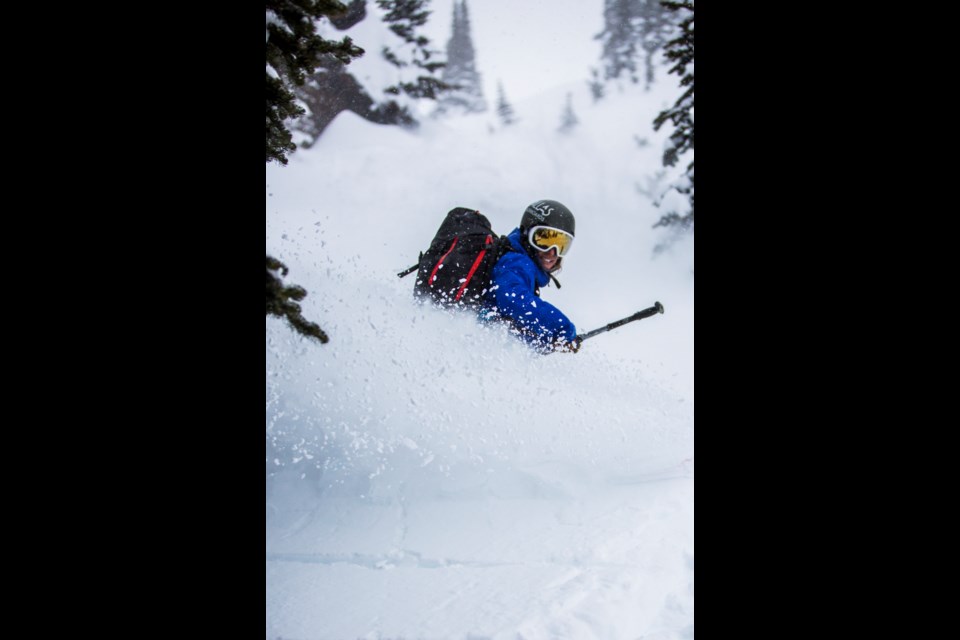SQUAMISH, B.C. – Christine Feleki has never been one for the conventional.
Instead of learning how to ski gates with the majority of her peers, Feleki and her buddies preferred the free-riding of snowboarding.
“I remember stealing my friend away from the ski club to go ride,” she said with a laugh.
Instead of bagging groceries, Feleki’s high school job was lifeguarding.
“I think I was drawn to the skill of knowing how to take care of someone in an emergency,” she said.
And after sampling the ski-bum scene like so many 20-somethings in Squamish, the Canmore-raised Feleki, sought a deeper connection to the sport she loved. She wanted to become a guide. But she wanted to do so on her tool of choice: a splitboard.
“A lot of people were telling me ‘you should just ski,’ ” the 36-year-old said.
In late January, while getting her boots fitted, Feleki received an email which confirmed her unconventional path had been worth it: she had passed her latest exam. Feleki had become the first female splitboarder certified as a full Association of Canadian Mountain Guides (ACMG) ski guide.
Her immediate feeling? Freedom.
“I’m a ski guide now,” she thought to herself. “There’s room to breathe.”
For the past 10 winters, Feleki had been taking deep lungfuls in some of the most spectacular mountain landscapes in North America such as the Bugaboos, Rogers Pass, B.C.’s Coast Range, the Cariboos and Mount Robson.
It was non-stop adventure, but it was also non-stop training. After earning a diploma at Thompson Rivers University, Feleki chipped away at her ACMG certifications, initially volunteering her time to gain on-snow experience before eventually being hired as an apprentice guide.
Steadily, she built up her mountain resumé, but more often than not, her employers wanted her to ski, suggesting in no uncertain terms that guides weren’t as effective when using a splitboard.
“In the mechanized ski world, my experience of it was that many places were not accepting of a snowboarder in those positions,” Feleki recalled.
With the encouragement of fellow splitboarding guides, Feleki continued to believe she could earn her spurs sliding sideways. Eventually, there came a point where she had to stand her ground.
“I was nervous about that conversation,” she admitted. “I said ‘I want to continue working here, but I need to do this on a board.’ ”
To the credit of her boss, after conferring with their long-standing clientele, her employers were willing to give Feleki a shot. They liked the way she guided. They didn’t care what tool she had on her feet.
“They agreed the tool doesn’t make the guide,” Feleki said.
Neither does the guide’s pronouns. Although she is the first woman splitboarder to earn her ski guide badge from the ACMG, Feleki doesn’t dwell on being a “trailblazer.”
“My focus is on doing my job,” she said. “I try not to focus on gender.”
She doesn't discount other females’ experiences of being discriminated against, however. Feleki knows there are many women who don’t feel comfortable in the male-dominated ski industry. She’s heard first-hand stories of passive-aggressive misogyny. She’s heard the inappropriate jokes.
“Women have had a way harder time in that sense,” she said.
To help break down those systemic biases, Feleki has been empowering her fellow females via women-specific ski mountaineering courses for the past several seasons. She’s seen first hand that representation can create emancipation.
“Women see women doing it and think ‘hey, I have a place there,’ ” Feleki said.
Feleki can relate to having a sense of imposter syndrome. In the decade since she read that Revelstoke splitboarder Scott Newsome passed his guide’s exam and decided that was the path she, too, wanted to follow, the biggest obstacle to passing her own exams was not the terrain or the snow or the heuristic traps to which backcountry skiers can oftentimes become susceptible to. Feleki's biggest trap was herself.
“My hurdle was remembering I’m doing a good job, despite what’s happening in my head,” she said. “I would have to remind myself that I had prepared as much as possible.”
Encouraging her, always, has been her husband Rob.
“He would often say ‘if only you could see yourself for how others see you.’ ”
She’s starting to. And thanks to the supportive group around her, Feleki doesn’t need the reminder as much these days. Well-wishes for having reached her goal have been pouring in from around the continent.
“This is a community,” she said. “I didn’t do this alone.”




